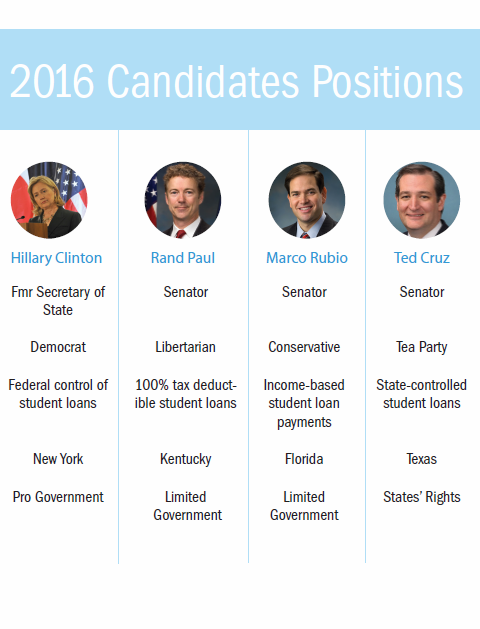Presidential candidates squabble over student loans
By: Rachel Cain – News Editor
The 2016 presidential election is more than a year away, but the declared Democrat and Republican candidates have already begun discussing their plans for the presidency. Certain proposed policies, such as student loans, will affect college students’ lives in the near future.
“Right now, if you look at any of the declared presidential candidates, there’s nothing on their websites that deals directly with student loans,” Daniel Birdsong, Ph.D., of the political science department said.
About 40 million Americans have student loans worth a total of more than $1 trillion, according to Market Watch.
All three declared Republican candidates voted in the Senate on the Student Emergency Loan Refinancing Act, which would have enabled more than 25 million Americans to refinance their student loans at lower interest rates, according to Market Watch. Ted Cruz and Rand Paul both voted against the legislation, according to the Huffington Post.
“I believe we need a candidate who realizes the insanely high cost of college, and works to help families better afford this,” Elaine Laux, junior political science and criminal justice major and president of the University of Dayton College Republicans, said. “We need someone who can eliminate for-profit colleges, and who can work to make sure education stays a public good, and not something that is only for the wealthy.”
Paul advocates for all tuition and student loan debt to be fully tax deductible, which would remove the current income restrictions and tax credit program, according to the LA Times.
However, critics to the plan say it would benefit wealthy families and students the most.
“Student loans is an issue Rand Paul keeps talking about, that we shouldn’t be refinancing our student loans, really just saying that students need to work harder and work their way out of college,” Zach Zugelder, the incoming president of UD College Democrats and junior political science major, said. “I don’t think he really sees where students are coming from.”
Marco Rubio is a co-sponsor of the newly introduced Dynamic Repayment Act. This legislation would enroll all federal loan borrowers in an income-based program where they paid 10 percent of their earnings each month, with a $10,000 annual exemption, according to Slate.
Ted Cruz said he understands students’ situations, because he spent 16 years paying off his student loans.
“[I] took over $100,000 in school loans, loans I suspect a lot of you can relate to, loans that I’ll point out I just paid off a few years ago,” he said at Liberty University.
Cruz has previously said that states, rather than the federal government, should be in control of student loans.
Although Hillary Clinton has not recently discussed her position on student loans, based on her record on voting in the Senate and her 2008 presidential campaign it is likely she will lean pro-borrower, according to the Huffington Post.
In 2006 and 2007, Clinton introduced the Student Borrower Bill of Rights Act. The legislation would have created changes to the student loan process, such as having limits on repayment plans to reflect income and allowed loans to be discharged in bankruptcy, according to the Huffington Post.
Clinton also voted in favor of the College Cost Reduction and Access Act in 2007, which expanded Pell grants, reduced interest rates and introduced the federal government’s Income Based Repayment and Public Service Loan Forgiveness plans, according to the Huffington Post.
During her 2008 campaign for the democratic nomination, Clinton said the federal government should take the primary role in the student loan business and that all student loan companies should be eliminated, according to the Huffington Post.
“Students should care about these issues and the candidates in the race because government affects almost every aspect of your daily life,” Laux said.
Birdsong said students should participate in the campaigns so that the candidates will know students are invested in the election.
“If you want the government to care about what you think and your issues, you have to show up. You can do that at the polls, you can write letters, you can volunteer for a campaign and get connected,” Birdsong said. “But, if you sit on your hands, don’t expect them to come to you.”


